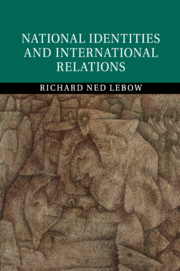Crossref Citations
This Book has been
cited by the following publications. This list is generated based on data provided by Crossref.
Tonami, Aki
2017.
Influencing the imagined ‘polar regions’: the politics of Japan's Arctic and Antarctic policies.
Polar Record,
Vol. 53,
Issue. 5,
p.
489.
Guzzini, Stefano
2017.
Militarizing politics, essentializing identities: Interpretivist process tracing and the power of geopolitics.
Cooperation and Conflict,
Vol. 52,
Issue. 3,
p.
423.
Al-Dayel, Nadia
and
Anfinson, Aaron
2018.
“In the Words of the Enemy”: the Islamic State’s reflexive projection of statehood.
Critical Studies on Terrorism,
Vol. 11,
Issue. 1,
p.
45.
Winston, Carla
2018.
Norm structure, diffusion, and evolution: A conceptual approach.
European Journal of International Relations,
Vol. 24,
Issue. 3,
p.
638.
Lebow, Richard Ned
2018.
The Rise and Fall of Political Orders.
Ward, Steven
2019.
Logics of stratified identity management in world politics.
International Theory,
Vol. 11,
Issue. 2,
p.
211.
Heiskanen, Jaakko
2019.
Spectra of Sovereignty: Nationalism and International Relations.
International Political Sociology,
Vol. 13,
Issue. 3,
p.
315.
Xie, Chao
2019.
How Status-seeking States Can Cooperate: Explaining India–China Rapprochement After the Doklam Standoff.
India Quarterly: A Journal of International Affairs,
Vol. 75,
Issue. 2,
p.
172.
Kinnvall, Catarina
and
Mitzen, Jennifer
2020.
Anxiety, fear, and ontological security in world politics: thinking with and beyond Giddens.
International Theory,
Vol. 12,
Issue. 2,
p.
240.
Lerner, Adam B.
2020.
The uses and abuses of victimhood nationalism in international politics.
European Journal of International Relations,
Vol. 26,
Issue. 1,
p.
62.
Wang, Hong
and
Ge, Yunfeng
2020.
Negotiating national identities in conflict situations: The discursive reproduction of the Sino-US trade war in China’s news reports.
Discourse & Communication,
Vol. 14,
Issue. 1,
p.
65.
Gustafsson, Karl
and
Krickel-Choi, Nina C.
2020.
Returning to the roots of ontological security: insights from the existentialist anxiety literature.
European Journal of International Relations,
Vol. 26,
Issue. 3,
p.
875.
Ziegler, Tamas Dezso
2020.
EU disintegration as cultural insurrection of the anti-Enlightenment tradition.
Journal of Contemporary European Studies,
Vol. 28,
Issue. 4,
p.
434.
Mendez, Alvaro
and
Turzi, Mariano
2020.
The Political Economy of China–Latin America Relations.
p.
27.
Ejdus, Filip
2020.
The Palgrave Encyclopedia of Peace and Conflict Studies.
p.
1.
von Billerbeck, Sarah
2020.
“Mirror, Mirror On the Wall:” Self-Legitimation by International Organizations.
International Studies Quarterly,
Vol. 64,
Issue. 1,
p.
207.
Krasnodębska, Molly
2021.
Politics of Stigmatization.
p.
49.
Tsygankov, Andrei P
and
Tsygankov, Pavel A
2021.
Constructing National Values: The Nationally Distinctive Turn in Russian IR Theory and Foreign Policy.
Foreign Policy Analysis,
Vol. 17,
Issue. 4,
Riemann, Malte
and
Rossi, Norma
2021.
Remote warfare as “security of being”: reading security force assistance as an ontological security routine.
Defence Studies,
Vol. 21,
Issue. 4,
p.
489.
Sobral, Pedro
2021.
Diplomacia “Bicultural” para a Criação de uma “Comunidade de História Compartilhada com a Humanidade”.
Interacción Sino-Iberoamericana / Sino-Iberoamerican Interaction,
Vol. 1,
Issue. 1,
p.
128.



